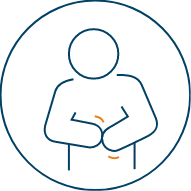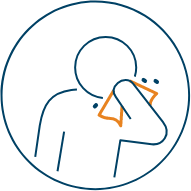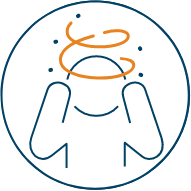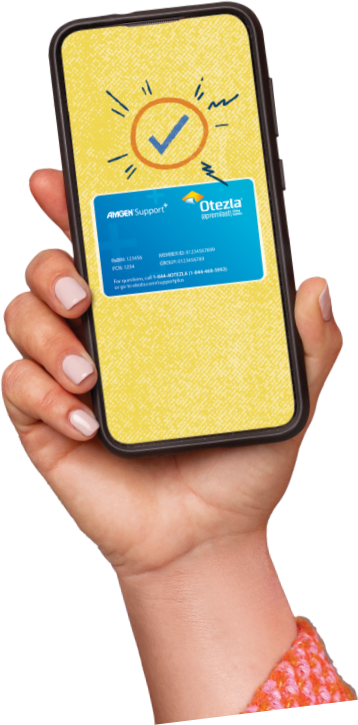Active Psoriatic Arthritis:
Active Psoriatic Arthritis:
Plaque Psoriasis:
Oral Ulcers Associated with Behçet’s Disease:
And, as with any medication, you may experience side effects



Click below to expand the table that includes the most common side effects of Otezla compared to placebo (sugar pill) seen in clinical studies involving adults with plaque psoriasis:
| Most common side effects (up to week 16) |
Otezla 298 people |
Placebo 296 people |
|---|---|---|
| Diarrhea | 49 (16.4%) | 15 (5.1%) |
| Headache | 39 (13.1%) | 15 (5.1%) |
| Nausea | 38 (12.8%) | 13 (4.4%) |
| Common Cold | 22 (7.4%) | 8 (2.7%) |
| Upper respiratory tract infection | 17 (5.7%) | 15 (5.1%) |
| Most common side effects (up to week 16) |
Otezla 920 people |
Placebo 506 people |
|---|---|---|
| Diarrhea | 160 (17%) | 32 (6%) |
| Nausea | 155 (17%) | 35 (7%) |
| Upper respiratory tract infection | 84 (9%) | 31 (6%) |
| Tension headache | 75 (8%) | 21 (4%) |
| Headache | 55 (6%) | 19 (4%) |
| Most common side effects (up to week 16) |
Otezla 143 people |
Placebo 145 people |
|---|---|---|
| Diarrhea | 37 (25.9%) | 12 (8.3%) |
| Headache | 33 (23.1%) | 16 (11.0%) |
| Nausea | 32 (22.4%) | 11 (7.6%) |
| Nasopharyngitis | 12 (8.4%) | 12 (8.3%) |
| Most common side effects (up to week 16) |
Otezla 298 people |
Placebo 296 people |
|---|---|---|
| Diarrhea | 49 (16.4%) | 15 (5.1%) |
| Headache | 39 (13.1%) | 15 (5.1%) |
| Nausea | 38 (12.8%) | 13 (4.4%) |
| Common Cold | 22 (7.4%) | 8 (2.7%) |
| Upper respiratory tract infection | 17 (5.7%) | 15 (5.1%) |
| Most common side effects (up to week 16) |
Otezla 920 people |
Placebo 506 people |
|---|---|---|
| Diarrhea | 160 (17%) | 32 (6%) |
| Nausea | 155 (17%) | 35 (7%) |
| Upper respiratory tract infection | 84 (9%) | 31 (6%) |
| Tension headache | 75 (8%) | 21 (4%) |
| Headache | 55 (6%) | 19 (4%) |
| Most common side effects (up to week 16) |
Otezla 143 people |
Placebo 145 people |
|---|---|---|
| Diarrhea | 37 (25.9%) | 12 (8.3%) |
| Headache | 33 (23.1%) | 16 (11.0%) |
| Nausea | 32 (22.4%) | 11 (7.6%) |
| Nasopharyngitis | 12 (8.4%) | 12 (8.3%) |
These are not all the possible side effects of Otezla. Ask your doctor about potential side effects, and be sure to let them know about any side effects that bother you or don’t go away.

Don’t be afraid to speak up. Your doctor may be able to offer tips for managing any side effects of Otezla.



Did you know you may be eligible to pay as little as $0* out-of-pocket per month with the Otezla Co-Pay Program if you have commercial insurance? Your co-pay can be applied to deductible, co-insurance, and co-payment, and is available regardless of your income level.
First-time co-pay card user? Find out more.
No insurance? Learn more about accessing your Otezla prescription.
*For commercially insured patients only. Eligibility criteria and program maximums apply.
See AmgenSupportPlus.com/copay-terms for full Terms and Conditions.


Do not take Otezla 30 mg tablets or Otezla XR 75 mg extended-release tablets if you are allergic to apremilast or to any of the ingredients in Otezla/Otezla XR
Otezla/Otezla XR can cause serious side effects, including:
Some medicines may make Otezla/Otezla XR less effective and should not be taken with Otezla/Otezla XR. Tell your doctor about all the medicines you take, including prescription and non-prescription medicines.
The most common side effects include diarrhea, nausea, upper respiratory tract infection, tension headache, and headache. These are not all the possible side effects with Otezla/Otezla XR. Ask your doctor about other potential side effects. Tell your doctor about any side effect that bothers you or does not go away.
Tell your doctor if you are pregnant, planning to become pregnant or planning to breastfeed.
You are encouraged to report negative side effects of prescription drugs to the FDA. Visit www.fda.gov/medwatch, or call 1-800-332-1088.
Please click here for the Full Prescribing Information for Otezla/Otezla XR.
Prescription Otezla® /Otezla XRTM (apremilast) is used for the treatment of:
Active Psoriatic Arthritis:
Plaque Psoriasis:
Oral Ulcers Associated with Behçet’s Disease:
Do not take Otezla 30 mg tablets or Otezla XR 75 mg extended-release tablets if you are allergic to apremilast or to any of the ingredients in Otezla/Otezla XR.
Otezla/Otezla XR can cause serious side effects, including: